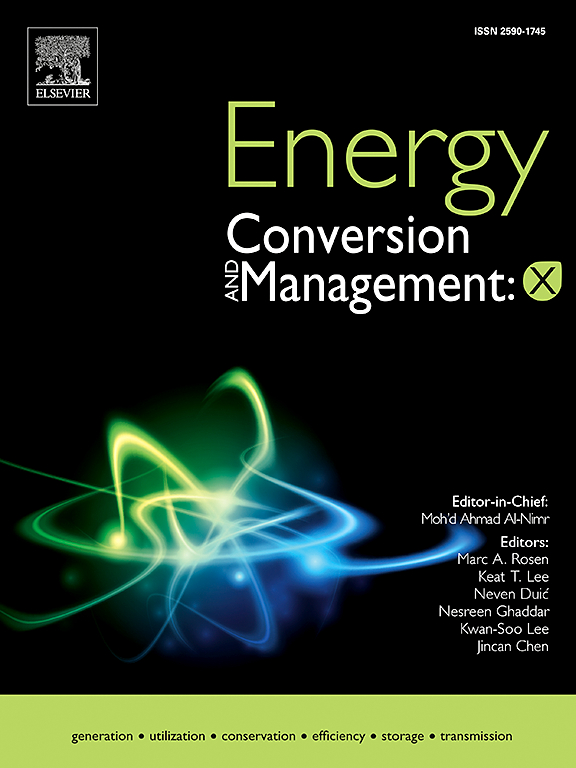Renewable microgrids with PEMFC, electrolyzers, heat pumps, hydrogen and heat storages in scenario-based day-ahead electrical market
IF 7.1
Q1 ENERGY & FUELS
引用次数: 0
Abstract
Microgrids enable the integration of renewable energy sources; however, managing electricity from intermittent wind and solar power remains a significant challenge. This study investigates two storage strategies for managing surplus renewable electricity in an IEEE 84-Bus microgrid with wind turbines and photovoltaic units. The first option involves producing hydrogen via electrolyzers, which is stored for later electricity generation through fuel cells. The second option involves converting surplus electricity into heat using heat pumps, which is then stored in thermal energy storage systems to efficiently meet the microgrid’s thermal load requirements. A scenario-based day-ahead scheduling model is proposed to optimize the microgrid’s electrical and thermal load management while considering uncertainties in market prices, wind speeds, and solar irradiance. The resulting large-scale optimization challenge is effectively tackled using the self-adaptive charge system search algorithm. The results indicate that, for the optimal utilization of excess renewable electricity, heat generation via heat pumps is more cost-effective than hydrogen production, primarily due to the inefficiencies in hydrogen conversion and the ability of heat pumps to produce several units of heat for each unit of electricity consumed. Moreover, heat pumps prove to be more economical than natural gas combustion in boilers for meeting the thermal demands across a wide range of gas prices. These findings highlight the economic benefits of integrating heat pumps and thermal energy storage systems into renewable energy microgrids.

可再生微电网与PEMFC,电解槽,热泵,氢和热储存在基于场景的提前电力市场
微电网能够整合可再生能源;然而,管理间歇性风能和太阳能发电仍然是一个重大挑战。本研究探讨了IEEE 84总线微电网中风力涡轮机和光伏发电机组管理剩余可再生电力的两种存储策略。第一种选择是通过电解槽生产氢气,这些氢气被储存起来,以后通过燃料电池发电。第二种选择是使用热泵将多余的电力转化为热能,然后将其储存在热能储存系统中,以有效地满足微电网的热负荷要求。在考虑市场价格、风速和太阳辐照度不确定性的情况下,提出了一种基于场景的日前调度模型,以优化微电网的电负荷和热负荷管理。采用自适应收费系统搜索算法有效地解决了由此产生的大规模优化挑战。结果表明,为了优化利用过剩的可再生电力,通过热泵产生热量比制氢更具成本效益,主要原因是氢气转换效率低下,热泵能够为每单位消耗的电力产生几个单位的热量。此外,热泵被证明比在锅炉中燃烧天然气更经济,以满足各种天然气价格的热需求。这些发现突出了将热泵和热能储存系统集成到可再生能源微电网中的经济效益。
本文章由计算机程序翻译,如有差异,请以英文原文为准。
求助全文
约1分钟内获得全文
求助全文
来源期刊

Energy Conversion and Management-X
Multiple-
CiteScore
8.80
自引率
3.20%
发文量
180
审稿时长
58 days
期刊介绍:
Energy Conversion and Management: X is the open access extension of the reputable journal Energy Conversion and Management, serving as a platform for interdisciplinary research on a wide array of critical energy subjects. The journal is dedicated to publishing original contributions and in-depth technical review articles that present groundbreaking research on topics spanning energy generation, utilization, conversion, storage, transmission, conservation, management, and sustainability.
The scope of Energy Conversion and Management: X encompasses various forms of energy, including mechanical, thermal, nuclear, chemical, electromagnetic, magnetic, and electric energy. It addresses all known energy resources, highlighting both conventional sources like fossil fuels and nuclear power, as well as renewable resources such as solar, biomass, hydro, wind, geothermal, and ocean energy.
 求助内容:
求助内容: 应助结果提醒方式:
应助结果提醒方式:


